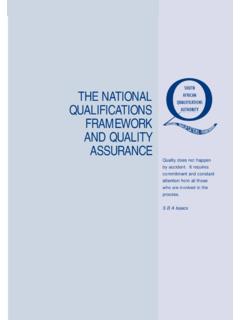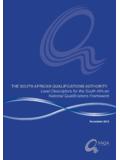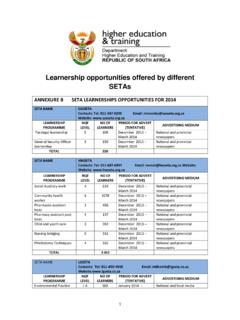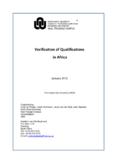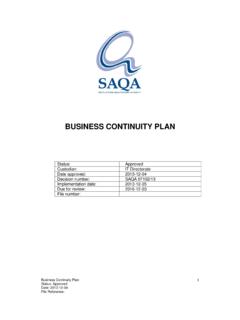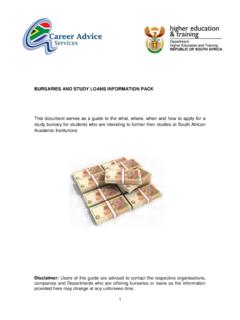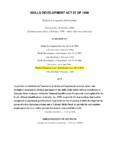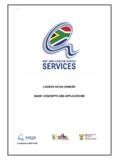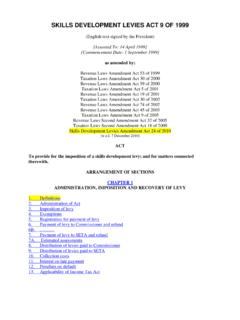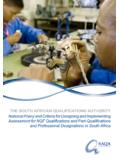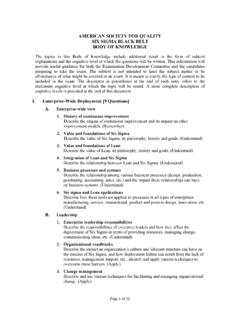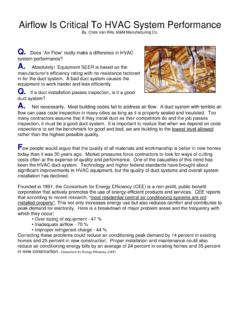Transcription of Graduate Attributes - South African Qualifications Authority
1 Hanlie Griesel and Ben ParkerJanuary 2009 GraduateAttributesA baseline study on South African graduates from the perspective of employersiiGraduate AttributesAcknowledgementsComment and contributions from a number of critical readers and partners at different phases of the research are gratefully acknowledged. In particular, the support of the South African Qualifications Authority (SAQA) in partnering HESA in the study must be noted, as well as the support of Cathy Sims, National Coordinator of the South African Graduate Recruitment Association (SAGRA), and the financial assistance received from SAGRA.
2 Further, the critical input from Glen Fisher (NBI Director: Strategy) directly shaped the study and, importantly also, the first-level analysis and reporting of data. The statistical analyses were undertaken by Irma Grundling of Social Surveys Africa, with HESA closely collaborating with Social Surveys who managed the implementation of the survey on behalf of the sector. And finally, our gratitude goes to all the employers who participated in the survey and shared their insight and expertise with the public higher education sector. Higher Education South Africa & the South African Qualifications Authority , 2008 Graduate Attributes iiiGraduate AttributesA baseline study on South African graduates from the perspective of employersHigher Education South Africa&The South African Qualifications AuthorityHANLIE GRIESEL & BEN PARKERJANUARY 2009 ISBN 978-0-620-45244-1ivGraduate AttributesBEN PARKER01 June 1953 27 October 2008 This publication was one of Professor Ben Parker s last contributions to education in histireless commitment to the transformation thereof.
3 In South Parker was the Director of Research at the South African QualificationsAuthority (SAQA) and a visiting Associate Professor in the School of Education at theUniversity of the Witwatersrand. Prior to this he was a Senior Researcher at the Centrefor Education Policy Development, Executive Dean of Education at the University of FortHare, Professor of Ethics, and Professor and Head of the School of Education at theUniversity of KwaZulu-Natal. During 1999 and 2000 he was seconded to the nationalDepartment of Education in the position of Director: Higher Education Colleges andTeacher Education Programmes, where he assisted with the development of the Normsand Standards for Educators and the incorporation of colleges of education into highereducation.
4 In 2001 and 2002, he served as a member of the Ministerial Study Team toreview the implementation of the National Qualifications Framework. In 2004 and 2005,he was Chairperson of the Ministerial Committee on Rural the short time that Professor Parker was with SAQA, he substantially revised SAQA sresearch agenda to build the Authority s capacity to do longer-term evidence-basedresearch. He was instrumental in building partnerships with universities and otherresearch institutions to ensure quality was an authentic person in all that he did and accomplished. He will be sorelymissed by the education work is dedicated to the memory of Professor Ben summary1 Context and overviewA brief overview of Graduate Attributes and employabilityThe Study: MethodResultsDiscussion and concluding comment2461219 ReferencesAcronyms and abbreviationsAppendix 1: QuestionnaireAppendix 2: List of employers21222328 Tables1.
5 Employers rating of basic skills and understanding2. Basic skills and understanding3. Employers rating of knowledge and intellectual ability4. Knowledge and intellectual ability5. Employers rating of workplace skills and applied knowledge6. Workplace skills and applied knowledge7. Employers rating of personal and interactive skills8. Personal and interactive skills9. Employer expectations91112131315151617 Figures1. Four levels of interpretation2. Percentage of Sample organisations per employment sector3. Organisational size4. Gap analysis basic skills and understanding5. Gap analysis knowledge and intellectual ability6.
6 Gap analysis workplace skills and applied knowledge7. Gap analysis personal and interactive skills78910121416 GraduateAttributesA baseline study on South African graduates from the perspective of employersPAGE 1 ExecutivesummaryIt has long been the case that higher education and the work-place share a common misunderstanding the role of each other. Employers sometimes voice concern over the quality of graduates exiting from universities while higher education feels that employers are not fully appreciative of what qualities and skills these graduates do possess. Higher Education South Africa (HESA) undertook this study in order to obtain a more accurate picture of Graduate Attributes and the way that these are perceived by the the role of higher education in human capital development and economic growth is not a new , there is little doubt that the Joint Initiative for Priority Skills Acquisition (JIPSA)
7 Embedded within the framework and goals of accelerated and shared growth provided additional impetus for the study on Graduate Attributes and employability reported on between higher education and employment in the work-place has been a focus of government in many countries. There is pressure on higher education from both government and employers to produce graduates who are employable in the sense that they have the Attributes , capabilities and dispositions to work successfully. Earlier conceptions that relied on lists of key generic skills have given way to more nuanced approaches, emphasise practical skills, understandings, personal Attributes and central assumptions underpinned the study s focus on the quality of graduates produced by public education institutions in South Africa: that the knowledge, skills, competencies and values of new graduates (the combined Graduate aattributes that are a necessary pre-condition for a Graduate to have achieved employability ) may be out of sync with the needs and expectations of employers.
8 Andthat the notion of skills may need to be redefined within the context of a changing world of that the study would need to shed light on what appears to be different positions with regard to the skills needs of employers and the role of higher education, HESA was mindful of a position frequently taken: higher education is expected to do better and more, not only in terms of the quality of graduates produced, but also in relation to the number and type of graduates produced within specific fields of study thus focused on two main issues: a) what employers expect; and b) their evaluation of what they get.
9 In different terms, the questionnaire was structured to focus on:The Attributes employers consider important and expect graduates to have when they enter the degree to which graduates from South Africa s public higher education institutions demonstrate these from the outcomes of the study illustrate the value the conceptual foundation, knowledge and intellectual approach to tasks produced by ahigher may be more of a common language between higher education and employers than is generally research makes it clear that there is a real need to address gaps between employer expectations cand higher education outcomes.
10 This has largely to do with proactive task-directed engagement and the application of degree of realism will need to be sustained on both sides, about how far higher education can be dexpected to bridge the gap , and the role that only employers can play in providing on-the-job learning and continuing a baseline study, the report already points to the need for more innovative ways in which higher and business can work together to create a seamless interface between these two crucial sectors of & OverviewPAGE 2 Graduate AttributesContext & Overview1 The UK research group High Fliers anticipate that the intake of new graduates will be cut by 17% in 2009.
